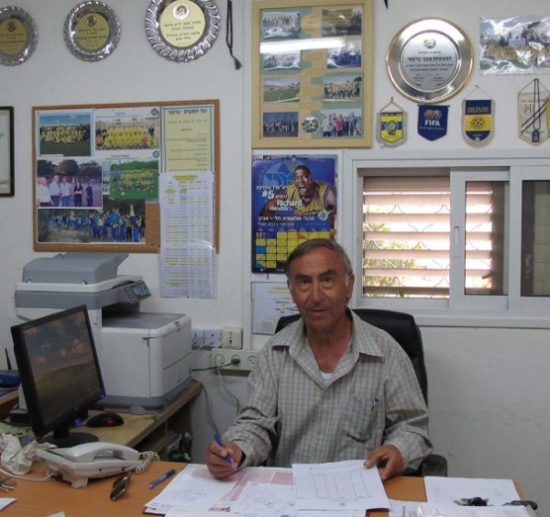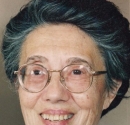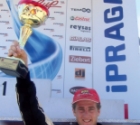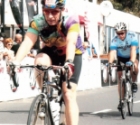THE DREAM TEAM OF CHAIM NADLER A soccer school that brings together Jewish and Arab kids
Category: Sports Issue No. 160
Chaim Nadler, Director of the Maccabi Tel Aviv-Kibbutz Barkai Soccer School in his trophy packed and pennant adorned on-site office
When Chaim Nadler first began talking about a soccer school to bring Israeli Jewish and Arab kids together on a level playing field, some fellow kibbutz members tried to blow the whistle on his vision of fostering better relations through the sport he loves so much.
Nadler persevered and now, with his original dream fulfilled, he is busy further developing and meeting new challenges as the green, green soccer fields of his collective home fill a spacious corner of the kibbutz with educational and sporting pride of the highest league.
The sounds of whistles and instructions being called out in Hebrew and Arabic – and in the summer months in English, as British student soccer coaches join in the project – can be heard of an afternoon and early evening as groups of eager kids don their blue and yellow Maccabi uniforms, take to the field and later tackle their homework together.
Nadler’s former detractors have had to eat their words when the chat around the kibbutz dining tables broached the subject of the Tel Aviv Maccabi-Kibbutz Barkai Soccer School, the education and sport center Nadler has built up over the last 12 years in what originally had been a field of waist-high thistle and thorns, hugging a pit of cow dung on one side and an ominous looking British built fort used by the IDF as a small prison on another.
Rising like a phoenix from the ashes, the TAM-Barkai Soccer School is no myth, its flexible touch lines reaching even, for what many would say is out of bounds, to the Palestinian Autonomous West Bank city of Jenin a mere 30 kilometers away.
Thousands of Jewish and Arab Israeli youngsters have trotted out of the changing rooms and onto the soccer fields of Barkai, trained, played and literally teamed up to represent the school in leagues, bringing home winners' shields that are trophies of a very different kind as they sportingly champion the cause of building a better future together.
Apart from two full sized soccer fields, the school nowadays boasts mobile classrooms, computer and fitness centers with state of the art equipment contributed to the project by The Maccabi Foundation and the International Fellowship of Christians and Jews founded by Rabbi Yechiel Eckstein.
“I admit to being soccer-mad since I was a kid but this school is not only about soccer, as the main emphasis has always been – and will always be – on the youngsters recognising each other for what they are, fellow human beings. They have a taste of how different things can be if they can take responsibility for a joint future through cooperation and working together,” explains Nadler who worked for many years in the Barkai kibbutz plastics factory before the community grudgingly gave him the okay to get the ball rolling on an educational project that has become another fine example of an individual believing that if you will it, it is no dream.
Once the kibbutz gave him the nod, Nadler contacted Israeli businessman and, former owner of the Maccabi Tel Aviv soccer club, Loni Herzkovitz, who readily agreed to financially support the formation of the Wadi Ara based soccer school. Experienced Jewish and Arab facilitators from the nearby Givat Haviva Jewish-Arab Center for Peace also worked on the project and summer soccer camps have become an annual feature on the spacious grounds of the Hashomer Hatzair kibbutz movement institute in Wadi Ara.
The first year Nadler spent turning the ugly duckling of an abandoned overgrown field into a lush soccer pitch and at the same time pitching his vision to local Arab and Jewish communities. By the second year, with a soccer field many a club would be more than happy to play on, Nadler kicked off the school with 150 local soccer-crazy lads between the ages of 7 and 18. Together with experienced social facilitators and tutors, Nadler’s school has successfully helped to kick negative notions of “the other” out of bounds.
Initially Nadler took out ads in local papers and handed out flyers. Those who said they wouldn’t come because they didn’t want to be with those from the other side of the deep divide were simply told by Nadler, “so don’t come.” Curiosity and really wanting to play soccer got the better of most and within a short time not only was there action on the sports field but also in the schools and on the academic learning benches, and the basis for outreach community work developed.
“Through the Wingate Institute I managed to get to know Jewish and Arab coaches in the region and now kids are coming from Faradis, Zichron Yaacov on the coast right across the region to Baka al-Gharbiya (a Muslim city near Barkai). We have kids from 46 Arab and Jewish communities participating presently,” says Chaim, his face and body language expressing his deep pride in the center’s achievements over the last dozen years bringing Druze, Jews and Muslims together on and off the playing fields.
After a few years the Maccabi Tel Aviv-Barkai soccer club had no less than three teams playing in the junior leagues. Five or six years down the line, the number of teams in the league doubled and nowadays stands at an astonishing 10 teams involving scores of players on the field and as many Jewish and Arab families on the sidelines cheering on “our boys.”
Half a year ago a group of young Palestinian hopefuls from Jenin joined the Jewish and Arab Israeli kids at Barkai for a two day program of workshops and soccer. The 30 Palestinian kids and their youth leaders stayed over in the homes of local folks and mixed teams of “us and them” soon became one as they played, laughed and mixed freely in the way that youngsters do when they recognize just how much they have in common.
The Israeli and Palestinian kids also travelled together to Haifa to attend a league match of professional league 'big guns' – Maccabi Haifa.
180 children with special needs, and others who come from problematic family backgrounds are also incorporated in innovative projects tailor-made to help them tackle the hardships of their situation. These children mix with all the other kids on the Barkai playing fields and enjoy using the onsite facilities of the Nadler kibbutz corner of coexistence where learning the skills and disciplines demanded in soccer and achieving better social skills and academic results together make them all champions at the end of the day.
During a recent ceremony held at the soccer school and attended by Israeli Knesset member Yitzhak Herzog and Rabbi Yechiel Eckstein, Palestinian schoolboy Omar Alsiadi from Jenin said he was proud to be part of the very special project that allowed Chaim Nadler to realize his dream, and they, the young participants, also begin to play out theirs.
“I want to thank my coach, educators and the head of this project in Barkai for giving me the opportunity to experience what many people in Jenin think is not the thing to do. Even so I am proud to be part of this program,” declared Omar loudly and with a broad smile.
Chaim Nadler, Director of the Maccabi Tel Aviv-Kibbutz Barkai Soccer School in his trophy packed and pennant adorned on-site office
 MEMBERSHOP PERKS-An ESRA Modiin Initiative
MEMBERSHOP PERKS-An ESRA Modiin Initiative KINDERTRANSPORT JUNE 5-6 1939
KINDERTRANSPORT JUNE 5-6 1939 HOW TO CARE FOR YOUR CHILD'S TEETH
HOW TO CARE FOR YOUR CHILD'S TEETH A Matter of Perspective
A Matter of Perspective A fantastic motor sport adventure – a dream come true
A fantastic motor sport adventure – a dream come true my sporting year 2007
my sporting year 2007 Lydia Aisenberg
Lydia Aisenberg